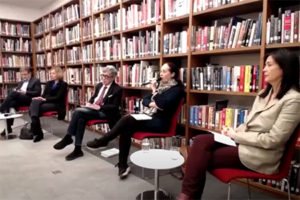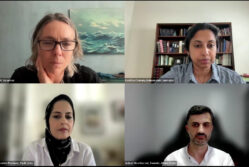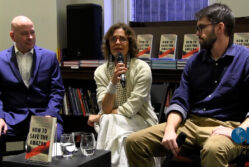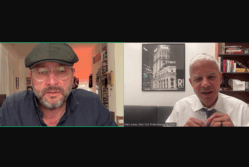Event Coverage Highlight

Journalists in Paris Discuss Betrayal and Tension Between US and Europe

Screenshot, left to right: Ulysse Gosset, Michaela Wiegel, David A. Andelman, Vivienne Walt and Liz Alderman.
Relations between the U.S. and Europe are strained and uncertain in the wake of Trump administration disruption and fresh disappointments during President Joseph Biden’s first year in office, a panel of journalists said at an American Library in Paris event on Dec. 8.
OPC Past President David A. Andelman moderated the discussion, which addressed shifting political sands across the region with a change of government in Germany, a precarious future for French President Emmanuel Macron next year, and an historic falling out between the U.S. and France in September. The panel was also held just one day after an online meeting between Biden and Russian President Vladimir Putin to discuss diplomatic issues surrounding Ukraine and smoldering conflict.
Michaela Wiegel, correspondent for Frankfurter Algemeine Zeitung, said while Germans cheered Biden’s victory in last year’s election, they doubted his capacity to restore relations that were battered by his predecessor. She said European attitudes toward the U.S. underwent “a massive change” during the Trump era, and most Germans do not trust the American electorate to keep Trump from returning to power in the next election.
Andelman asked if Biden put new German Chancellor Olaf Scholz in an awkward position over Russia’s Nord Stream II Pipeline through Ukraine when he told Russia that if it invaded Ukraine, the U.S. would not support the pipeline, possibly forcing the hand of Russia to cut the flow of gas from Russia to Germany.
“It doesn’t seem very logical to tell Putin – ‘don’t invade Ukraine, so then you can push your gas through the pipeline to the Germans,’” Wiegel said. “But in any case, [Germany] can still rely on the French and French nuclear power if ever our gas pipelines get cut.”
Ulysse Gosset, foreign affairs correspondent for BFM-TV in France, said as Macron prepares to take over the European Union presidency on Jan. 1, rising opposition in France could oust him by next summer.
“We are living in uncertain and dangerous times. And we need strong leaders to face these challenges,” he said.
Gosset said France and the U.S. are still reeling from the most significant diplomatic strain in more than 100 years. In September, the Biden administration and the U.K. announced a deal with Australia to build nuclear powered submarines for the country’s navy. France, unaware of the deal until it was announced, was shocked as it scuttled an agreement France already had in place to build conventional submarines for Australia. Macron was outraged, and Paris recalled ambassadors in Washington and Canberra. Gosset called it the worst betrayal between the two nations since 1862, which broke an “era of friendship and peace” that had been going strong since 2005.
“There is always a cycle of conflict between Paris and Washington,” Gosset said. “But this betrayal was considered to be one of the most important. It was a question of confidence. There was a lot of dissolution in Paris when it was known that [the deal with Australia] would not be possible.”
He added that France is also wary of getting dragged into conflict with China due to its escalating cold war with the U.S.
Liz Alderman, New York Times chief European business correspondent, said since the Trump administration, China has become the major U.S. foreign policy issue that everything else revolves around, a priority that continues in the Biden White House.
U.S. concerns about the rise of China spurred the submarine deal that bruised French relations, because the administration wanted Australia to have nuclear capabilities to counter China’s rapid nuclear development.
She cited a recent interview she and her colleague, Paris bureau chief Roger Cohen conducted with French Finance Minister Bruno Le Maire, who said the U.S. wants to confront China and keep it from displacing the U.S. as the top global superpower, but the EU wants to engage China.
“Europe’s strategic priority, by contrast, is that Europe wants to have independence, which basically means that Europe wants to have the ability to build more of its own defense, make its own way on important issues like climate change, defend its own economic interests,” Alderman said. “In order to avoid serious divergence between the United States and Europe, Europe does basically want to be recognized as one of the three superpowers in the world alongside China and the United States.”
Andelman asked Vivienne Walt, OPC Governor and Paris correspondent for TIME & Fortune, to address policy differences toward the Middle East. Walt had recently returned from a reporting trip to Saudi Arabia and was in Jeddah when Macron arrived there and became the first Western leader of note to sit with Mohammed bin Salman Al Saud, colloquially known as MBS, since Jamal Khashoggi’s murder three years ago.
Walt said with Saudi Arabia sitting on the biggest global oil reserves, it sees itself as a major power broker with leverage to play a role in an Iran deal with Western powers, and in the prospects for peace in Yemen or Israel.
While Macron is making overtures, Biden has kept his distance and does not want to deal with MBS, she said. Macron and Europe’s point of view is that “the U.S. cannot be trusted. For one thing, we might have Trump back again in three years’ time, and we can’t rely on the government and administration in Washington that’s going to make decisions on foreign policy that we can go along with.”
Watch the full video of the event via the window below.



